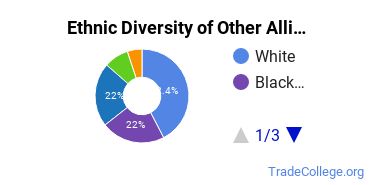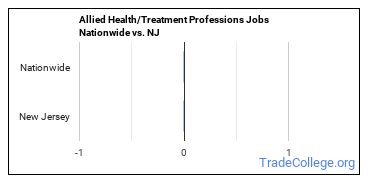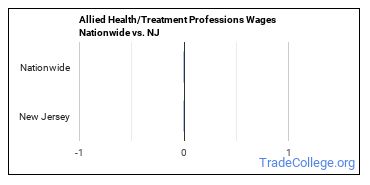Find Trade Colleges
Allied Health/Treatment Professions Schools in New Jersey
84 students earned Other Allied Health Diagnostic, Intervention, and Treatment Professions degrees in New Jersey in the 2021-2022 year.
As a degree choice, Allied Health/Treatment Professions is the 41st most popular major in the state.
Featured schools near , edit
Education Levels of Allied Health/Treatment Professions Majors in New Jersey
Other Allied Health Diagnostic, Intervention, and Treatment Professions majors in the state tend to have the following degree levels:
| Education Level | Number of Grads |
|---|---|
| Associate Degree | 47 |
| Bachelor’s Degree | 37 |
Gender Distribution
In New Jersey, a other allied health diagnostic, intervention, and treatment professions major is more popular with women than with men.

Racial Distribution
The racial distribution of other allied health diagnostic, intervention, and treatment professions majors in New Jersey is as follows:
- Asian: 2.4%
- Black or African American: 19.0%
- Hispanic or Latino: 9.5%
- White: 51.2%
- Non-Resident Alien: 3.6%
- Other Races: 14.3%

Jobs for Allied Health/Treatment Professions Grads in New Jersey

Wages for Allied Health/Treatment Professions Jobs in New Jersey

Most Popular Allied Health/Treatment Professions Programs in NJ
There are 5 colleges in New Jersey that offer other allied health diagnostic, intervention, and treatment professions degrees. Learn about the most popular 5 below:
In their early career, Salem County College grads earn an average salary of $33,953. The student loan default rate is 2.50% which is lower than average. Of all the students who attend this school, 63% get financial aid.
Of all the teachers who work at the school, 58% are considered full time. Students enjoy a student to faculty ratio of 15 to 1. This school boasts a lower than average student loan default rate of 1.10%.
This school boasts a lower than average student loan default rate of 1.50%. In their early career, TESU grads earn an average salary of $60,491. 20 to 1 is the student to faculty ratio.
An average student at FDU will pay a net price of $15,651. Most students complete their degree in 4.30 years. The student loan default rate of 2.40% is a good sign that graduates can afford their loan payments.
Students enjoy a student to faculty ratio of 14 to 1. A typical student attending NJCU will pay a net price of $13,718. Roughly six years after entering college, graduates of this school earn $43,504 a year.
Related Majors in New Jersey
Below are some popular majors in the state that are similar to other allied health diagnostic, intervention, and treatment professions.
| Major | Annual Graduates in NJ |
|---|---|
| Cardiovascular Technology | 189 |
| Medical Radiologic Technology | 166 |
| Sonographer/Ultrasound Technology | 147 |
| Surgical Technology | 134 |
| Radiologic Technology | 109 |
| Respiratory Care Therapy | 90 |
| Electrocardiograph Technology | 70 |
| Emergency Medical Technology | 45 |
View all majors related to Allied Health/Treatment Professions
Explore Major by State
Alabama
Arkansas
Connecticut
Florida
Idaho
Iowa
Louisiana
Massachusetts
Mississippi
Nebraska
New Jersey
North Carolina
Oklahoma
Rhode Island
Tennessee
Vermont
West Virginia
View Nationwide Allied Health/Treatment Professions Report
References
More about our data sources and methodologies.




